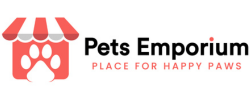Indoor dogs in Pakistan need special attention when it comes to health and nutrition. Living primarily inside changes their activity levels, exposure to sunlight, and energy requirements compared to outdoor dogs. Additionally, the country's climate, urban lifestyle, and common breeds bring unique dietary considerations that pet owners must address. Providing the proper nutrition is essential for maintaining their energy, immune system, and overall well-being. Petsemporium offers guidance and products tailored to help indoor canine thrive in a healthy and balanced way.
Importance of a Healthy Diet for Indoor Dogs
Indoor dogs need proper nutrition to stay healthy, energetic, and well. They are also not as active as outdoor ones, so they consume less energy and are more likely to gain weight. Providing them with balanced proteins, healthy fats, and essential vitamins helps avoid obesity, lethargy, and digestive issues.
Malnutrition may also contribute to vitamin deficiencies, low immunity and other chronic health problems. Purchasing quality food and regulating the amount of food they eat will help you prevent overfeeding your canine. Considerate eating habits keep your furry friend healthy, shiny-haired and active and happy during their life.
Common Indoor Dog Diet Options in Pakistan
Indoor dog nutrition is a matter of selecting the appropriate means to maintain a healthy body weight and stability, as well as providing normalcy to your canine. Some common options are:
Commercial Food: Dry Kibble
In Pakistan, dry kibble is convenient, readily available and very affordable. It offers healthy nutrition when one uses good brands. Others are filled and artificially added. Choose famous brands such as Royal Canin or Farmina. Indoor canines require regular portion control to ensure they do not become obese and retain lean muscle mass.
Wet Food (Canned Food)
Wet food is pleasant and moist and is the best option when feeding picky eaters or pets with dental problems. It is more nutritious and more costly than kibble, but it doesn't go to food easily. In Pakistan, it is only available with some brands. Food dehydration and feeding balance cost, hydration, and nutrition can be achieved by combining dry food.
Homemade Meals
Self-cooked food (chicken, rice, eggs and vegetables) makes it possible to control the ingredients and freshness completely. They may be specific to their likes and sensibilities. Nutrient imbalances must be carefully planned, though. A visit to a vet will make sure the meal has enough proteins, fats, vitamins and minerals to keep them healthy.
Raw Diet (BARF)
Raw diets replicate natural meals containing raw meat, bones, and organs, which may enhance coat and vitality. Nevertheless, there are risks such as contamination by bacteria, an imbalance of nutrients, and bone injuries. To be safe and feed them fully, strict hygiene and veterinary advice should be followed in the event of use in Pakistan.
Best Foods to Choose for Indoor Dogs in Pakistan
In Pakistan, they have the advantage of diets designed based on a reduced level of activity and environment. Choosing good commercial foods or well-balanced homemade meals is the best way to maintain maximum health. The following are just a few of the recommended food varieties and essential nutrients to keep in mind regarding the health of your pet.
Protein Sources
Recommended options are:
-
Chicken
-
Beef
-
Fish
-
Eggs
Proteins play an essential role in muscle growth, tissue healing, and immunity. Animal proteins are of high quality and contain essential amino acids, which help with development and maintenance. Moderate protein intake is recommended to sustain lean muscle mass without excessive weight gain in indoor canine.
Carbohydrate Sources
Recommended options are:
-
Rice
-
Oats
-
Sweet Potatoes
Carbohydrates are a source of energy and assist in digestive health. Complex carbohydrates such as oats and sweet potatoes provide a longer-lasting energy release and are high in fibre, which encourages a healthy bowel movement. These are soft on the stomach and can be used on those that are not very active.
Healthy Fats
Recommended options are:
-
Fish Oil
-
Olive Oil
-
Flaxseed
Healthy fats play an essential role in providing energy, skin maintenance and mental activity. Fish oil contains omega-3 fatty acids that promote bounce-back hair as well as curb inflammation. The moderate intake of healthy fats will balance the nutrition of a dog.
Vegetables & Fruits
Recommended options are:
-
Carrots
-
Pumpkin
-
Apples (without seeds)
Vegetables and fruits are rich sources of vitamins, minerals and antioxidants. Carrots and pumpkins favour eye health and digestion, and apples provide vitamin C and fibre. These are beneficial to health and can be consumed by indoor dogs in moderation.
Nutritional Needs of Indoor Dogs
To keep fit and healthy, they need a well-balanced diet. Proteins contribute to muscle wellness and give the body energy, whereas carbohydrates are a consistent source of energy and contribute to digestion with fibres. Fats are also crucial in providing a healthy skin and shiny coat, along with energy.
Minerals and vitamins maintain the immune system and are suitable for promoting health. Dietary requirements change with age, breed and activity, so adjusting portions and types of food is necessary. Hence, nutritional supplements are used to keep them at the right weight, to provide energy and ensure a long and happy life.
Guidelines About Portion Control and Feeding Schedule
The key to weight gain control is to feed portions to achieve weight control and general health. An excess in feeding may cause obesity, laziness and other health complications. Adult canines typically respond well to two meals per day, and these meals should be evenly spaced in the morning and evening.
The number of portions must be varied according to breed, weight, and the level of activity to avoid overeating. In the case of small breeds such as Labrador, German Shepherd, and local mixed breeds, the breed size-specific example of a sample daily feeding chart would be 200-300 grams of food divided into two meals per day.
Common Mistakes in Indoor Dog Diet Routine
Overfeeding
Most owners overfeed their pets using additional snacks or food leftovers. This contributes to extra calories. It also disturbs a balanced meal plan, and usually results in obesity, digestive upheaval and nutrient imbalances. Regular, controlled eating is among the keys to healthy weight and well-being.
Feeding Low-Quality Foods
Not all types of commercial foods contain the necessary nutrients or fillers. Using poor-quality alternatives might lead to low-quality coat health, low energy, and vitamin deficiencies. Buying quality and nutritious foods will help them receive all the nutrients they require.
Ignoring Portion Control
Compared to outdoor, indoor canines have lower calorie intake. Eating without thinking about the activity level or amount of food may soon result in gaining weight, feeling tired, and having various health issues. It is important to plan meals according to energy requirements.
Conclusion
Ending with the whole discussion, a balanced diet is of great importance to the health and well-being of dogs in Pakistan. Health, quality of food, and proper portion control are going to prevent weight gain, digestive problems, and other issues. Petsemporium offers products and advice on how to take care of your canine. Speak to your vet now to make a personalized diet.
Frequently Asked Questions
1. Which is the most suitable protein source in Pakistan?
Lean meat such as chicken, beef, fish and eggs contains vital protein to help in muscle and energy. Always prepare meat and fish without spices and oil.
2. Is it okay to feed them rice daily?
Yes, simple rice is safe and gives you energy, but do not use spices, salt, or sauces. Brown rice is superior in fibre.
3. How do I prevent obesity among small dogs?
Feed a balanced diet, control portions and play or walk daily. Eschew table scraps and high-energy snacks.
4. Do dogs need any supplements?
Supplements can be used when the diet is insufficient in nutrients, though a vet must be consulted first. Overuse can be harmful.

